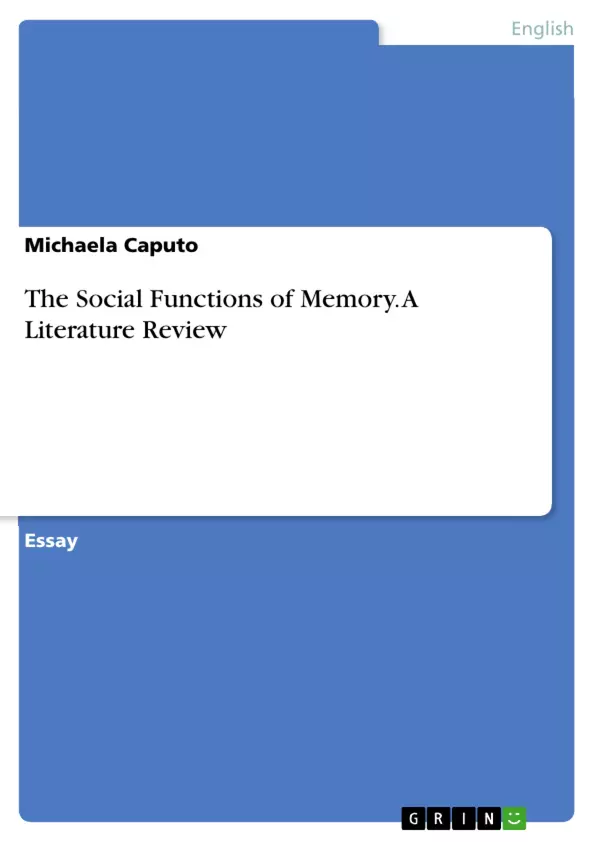This paper will situate the concept of memory into a social and cultural context: It will show how individual memory and cultural memory influence and depend on each other, and that thereby, a cultural identity is formed. Also, it will depict the effects of cultural memory on society and politics.
As it refers to a rather abstract notion, the term "memory" is highly difficult to define or describe. Memory is not only the object of psychology but also of the field of humanities, in particular philosophy, social studies and cultural studies.
Inhaltsverzeichnis (Table of Contents)
- The Social Functions of Memory
- Individual Memory
- Collective Memory
- Cultural Memory
- Cultural Memory and Identity
- Cultural Memory and Politics
Zielsetzung und Themenschwerpunkte (Objectives and Key Themes)
This paper examines the concept of memory within a social and cultural context, exploring the interplay between individual memory and cultural memory in shaping cultural identity and societal dynamics. It further analyzes the influence of cultural memory on society and politics.
- The interrelationship between individual memory and cultural memory.
- The role of cultural memory in forming cultural identity.
- The impact of cultural memory on social and political structures.
- The complexities of historical representation and the potential for manipulation in cultural memory.
- The role of cultural memory in shaping political culture and identity.
Zusammenfassung der Kapitel (Chapter Summaries)
- The Social Functions of Memory: This chapter introduces the concept of memory as a multifaceted phenomenon, encompassing individual, collective, and cultural memory. It explores the constructivist approach to memory, highlighting the selective nature of our recollections and the role of narrative schemata in shaping autobiographical memory.
- Collective Memory: This section delves into the concept of collective memory, specifically exploring the role of family as a primary social group. It argues that individual memory is influenced by shared experiences, attitudes, and values within a collective context. Halbwachs' idea of collective representations is introduced as the force that transforms individual memories into shared collective memories.
- Cultural Memory: This chapter further develops the concept of cultural memory, focusing on how it is preserved and transmitted within a society. Assmann's distinction between communicative and cultural memory is explored, emphasizing the role of fixed points (such as texts, rites, and monuments) in structuring and objectifying cultural memory. The chapter also highlights the influence of prominent scholars such as Pierre Nora and Ann Rigney on the field of cultural memory studies.
- Cultural Memory and Identity: This section examines the close relationship between cultural memory and identity. It explores how cultural memory provides a shared store of knowledge that fosters a sense of unity and belonging within a group. The chapter draws on John Locke's observations about the construction of identity through acts of memory and the role of cultural memory in preserving and shaping a group's identity.
Schlüsselwörter (Keywords)
This paper explores key concepts such as individual memory, collective memory, cultural memory, cultural identity, political culture, Vergangenheitsbewältigung, historical representation, and manipulation of memory. It examines the impact of memory on societal structures, political discourse, and identity formation. The work draws on prominent figures like Halbwachs, Assmann, Nora, and Confino to provide a comprehensive understanding of the social functions of memory.
Frequently Asked Questions
How do individual and cultural memory influence each other?
They are interdependent; individual memory is shaped by social groups (like family), while cultural memory provides the shared frameworks that form a collective identity.
What is the difference between communicative and cultural memory?
Based on Assmann's theory, communicative memory is short-term and based on everyday interaction, while cultural memory is long-term and preserved through texts, rites, and monuments.
What role does memory play in politics?
Cultural memory influences political culture and identity, but it can also be used for manipulation and specific historical representations.
Who are the key scholars mentioned in memory studies?
The paper draws on theories by Halbwachs, Jan and Aleida Assmann, Pierre Nora, and Ann Rigney.
How is identity constructed through memory?
Identity is formed through a shared store of knowledge and acts of memory that create a sense of unity and belonging within a group.
- Quote paper
- Michaela Caputo (Author), 2012, The Social Functions of Memory. A Literature Review, Munich, GRIN Verlag, https://www.hausarbeiten.de/document/379361


